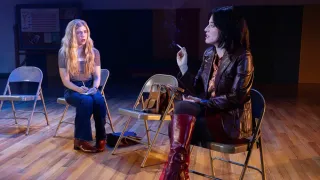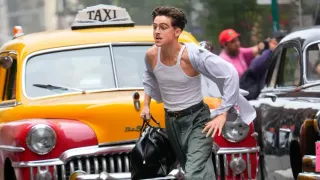October 9, 2017
The Untold Tales Of Armistead Maupin (Out On Film, OUTshine, Reel Q, Twist)
Roger Walker-Dack READ TIME: 3 MIN.
Even with the major advances the LGBT community has made in the past few decades, it is still not blessed with an over-abundance of its own heroes and role models. It, therefore, comes as no surprise that when one is blessed with an innate talent to articulate how many of us feel and is a masterful storyteller who succinctly captures the true spirit of our history, it only seems right that he should become the subject of an affectionate documentary.
Armistead Maupin was born at the end of WW2 to an aristocratic Southern family and spent his privileged childhood and college days in North Carolina. What was even more surprising is that after young Maupin had done a couple of spells overseas serving in the US Navy, he cut his writing teeth working for the segregationist Senator Jesse Helms, who was one of the most virulent homophobes in the Senate at the time.
However, in 1971, he was offered a job with the Associated Press's San Francisco Bureau, and he never looked back. Maupin maintains that he was still a virgin until he was 26 years old, and didn't come out of the closet until he was 30. He mischievously reveals to filmmaker Jennifer M. Kroot that he certainly made up for lost time and that his many sexual partners included Rock Hudson.
In 1974 Maupin began what would become the celebrated "Tales of the City" novels, a set of stories that told the whole world about the goings-on in free-spirited San Francisco (even then recognized as the nation's gay capital). He wrote it initially as a daily serial, which for most of its run was published by the San Francisco Chronicle. Because it was so current, Maupin could use it to document everything that was happening in that part of the globe, including the onslaught of the AIDS pandemic that would decimate the city's LGBT community.
When asked if one of many beloved characters in the "Tales of The City" novels was based on him, he confessed, "I've always been all of the characters in one way or another." Certainly, he used the daily diary to tell his own story, such as the coming out letter he penned ostensibly for the fictional Micheal Tolliver, but which was really aimed at Maupin's parents, whom he wanted to know about his sexuality finally. A nice touch in the film was to have the letter read out loud by several people, including Olympia Dukakis and Laura Linney, who had starred in the TV miniseries.
Maupin was probably one of the first people to ever write about AIDS in those days, and like any of us from that generation who survived, he still mourns the losses and shows the scars of what many of us went through. In his case, his long-term partner, who was HIV+, embraced the arrival of protease inhibitors in 1996 which gave him, and others, a new lease of life. In his case, that meant separating from Maupin and going forward alone.
Maupin finds it easy to articulate his feelings, whether it be about his unfettered happiness with his husband (who is 30 years his senior), or his more controversial stance on outing closeted gay people, which started when he went public on Rock Hudson's sexuality as the actor's friends refused to admit that he was dying of AIDS.
Now, as a beloved senior figure in the community, Maupin is still doing countless readings throughout the country (his appearance at P-Town's Bear Week has become an annual event), and he is busy working on his memoirs, which are due to be published in the fall. He hints, too, that the long-awaited follow-up to the three TV miniseries based on the books might finally be poised to move forward.
Maupin stresses that he knows that he is happy just to be alive and that what has made him happiest is the fact that he is blessed to be surrounded by good friends -- what he terms as his "logical family," which, for LGBT people, will always supplant our biological family any day.






